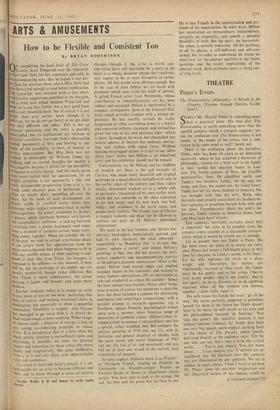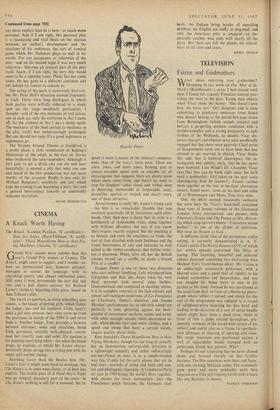S UKELY Mr. Harold Pinter is something more than a practical
joker. His new play The Homecoming is surely something more than the squalid scenario which a synopsis suggests—un- less the confusion over The Homecoming is not simply in the minds of his critics, but a con- fusion in his own mind as well? Surely not.
There is no confusion about the narrative. Teddy, who has been six years at an American university, where he has acquired a doctorate of philosophy, returns for a brief visit to his family in their sordid but spacious house in Lon- don. The family consists of Max, the irascible paterfamilias, Sam, the chauffeur uncle, and Teddy's two brothers, Lenny, the sly one, the pimp, and Joey, the stupid one, the failed boxer. Teddy has left his three children in America, but has brought with him his wife, Ruth, who blatantly and sexually teases both his brothers be- fore agreeing to prostitute herself both with and for them. Unenthusiastic about his wife's be- haviour, Teddy returns to America alone; Sam and Max have heart attacks.
This summary inevitably excludes much that is important, but even in its simplest form the synopsis seems capable of a reasonable interpre- tation which it would be craven not to attempt.
Let us assume then that Teddy is Pinter. He has been away six years (it is nearly six years since Pinter last wrote a full-length'play); in that time he's become, in Lenny's words, 'a bit inner.' Let his wife represent his work as a play- wright and film-writer, for writers are traditionally 'married to' their work. His family must be his public and/or his critics ('they're very warm people; they're my family; they're not ogres"). So let us discover, as in an algebraic equation when all the symbols are known, whether x does really equal x.
His wife teases his family but won't `go all the way.' She seems perfectly prepared to prostitute herself for them in the future but Teddy doesn't want to be there; he will return to his sons and his philosophical research 'in America.' You take the 'point? My tentative solution is not without internal evidence, for Teddy does have one very big speech, quite explicit, harking back to the theme of The Dwarfs, which speech, delivered directly at the audience, says: 'I'm the one who can see, that's why I write my critical works. . . . You're just objects. You just move about... . I can observe you.' It seemed not in-
significant that the blackout after this outburst
was not illuminated by any applause. We sat in silence, in angry silence. I find it hard to see how Mr. Pinter, given his macabre imagination and the allegorical nature of his fancies, could be
[Continued on pace 758 Continued from page 7551
any more explicit than he is here—or much more personal. And if I am right, this personal play is a fascinating and vital thesis on the relation between an author's development and the reactions of his audiences, the sort of ironical game which Mr. Nabokov plays so well in his novels. For our acceptance or otherwise of the play—and on the second night it was very much otherwise—becomes an integral part of the play itself. Again, if I am right, the very title would seem to be a supreme irony. Pinter has not come home. He has gone to a different continent and left behind his fancies to console us.
The acting of the parts is nauseously first-rate, but Mr. Peter Hall's direction seemed frequently at fault. There were long duologues in which both parties were wilfully tethered to a single spot on the stage—needlessly puritanical, I thought—and of the two moments of real action, one in each act, only the eroticism in Act 2 came off, for the violence in Act I was a damp squib. The weakness of the final curtain (a weakness in the play itself) was embarrassingly prolonged. But one should not carp. It's a good nightmare as nightmares go. The Yvonne Arnaud Theatre at Guildford is a pretty place, a little reminiscent of Kipling's illustration of the whale in the Just So Stories who swallowed the sock-suspenders. Although it isn't easy to get a drink one can see and hear beautifully; it seemed a pity that what one saw and heard of the first production was not more worthy of the occasion. Really it was only Sir Michael Redgrave's sensitivity and tact which kept the evening from becoming a bore, that and a general benevolence towards an undeniably welcome institution. .
DAVID BENEDIC1 US



































 Previous page
Previous page